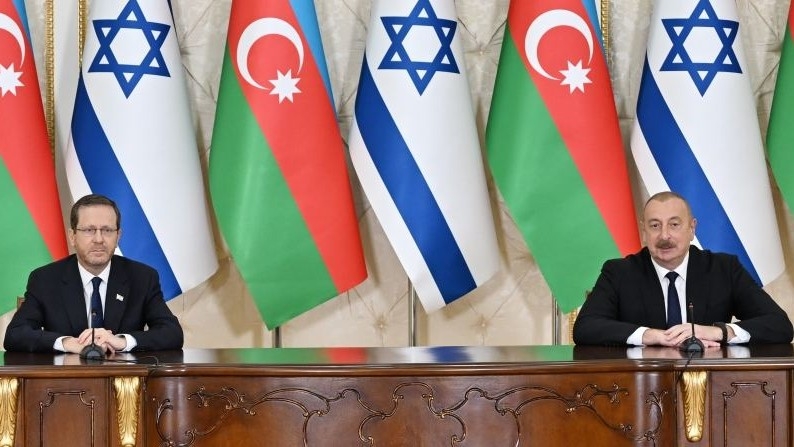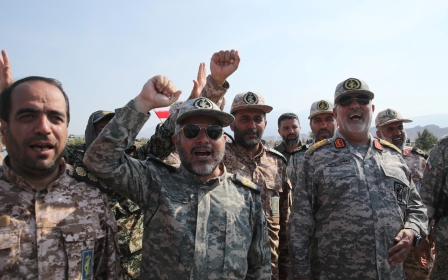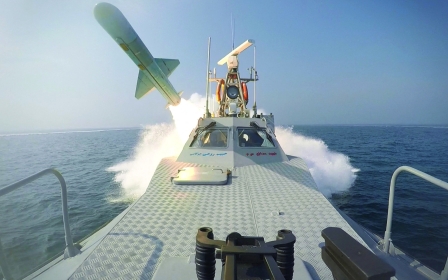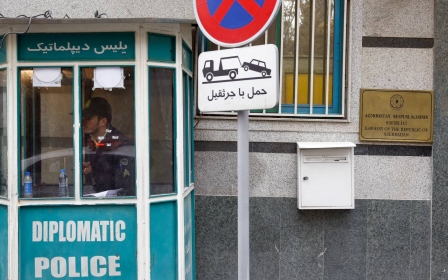Israeli president flies to Azerbaijan as increasingly public alliance strengthens

Israeli President Isaac Herzog landed in Azerbaijan on Tuesday in the latest stage of a very public evolution of ties between the two countries.
Herzog, who is travelling with his wife, met Azerbaijani President Ilham Aliyev in Baku at the Zugulba presidential palace. Israel's Health and Interior Minister Moshe Arbel also accompanied Herzog.
The visit will see a bilateral agreement signed between Israel and Azerbaijan on cooperation in healthcare. Aliyev announced that the sides were also very actively cooperating in the field of cyber security, without providing further details.
In addition to official meetings, Herzog is expected to attend a festive event dedicated to the 75th anniversary of Israel, and will meet with activists of the local Jewish community.
While no big decisions are expected to be announced, the pace at which the relationship is flourishing more broadly is an indication of the political commitment both sides are making towards each other.
New MEE newsletter: Jerusalem Dispatch
Sign up to get the latest insights and analysis on Israel-Palestine, alongside Turkey Unpacked and other MEE newsletters
According to a 2009 US diplomatic memo, made public by WikiLeaks, Aliyev once compared his country's relationship with Israel to an iceberg: "Nine-tenths of it is below the surface."
This increasingly appears to be no longer the case.
'Coming out'
Israel and Azerbaijan "have grown increasingly more comfortable about their relations", Yonatan Touval, an analyst at the Israeli Institute for Regional Foreign Policies, told Middle East Eye.
Israel was one of the first countries to recognize Azerbaijan's independence in 1991 following the dissolution of the Soviet Union. Since then, both countries have maintained diplomatic relations, with Israel inaugurating its embassy there in 1993.
"I would say that a major leap forward in this process of 'coming out' took place in 2016 when President Aliyev used a joint press conference with Israel's [President Benjamin] Netanyahu to expose the depth and breadth of the relationship," Touval said.
'The growing publicness appears to serve the interests of both sides, both regionally and globally, with Azerbaijan hoping its closeness to Israel would help it in Washington'
- Yonatan Touval, analyst
In a speech at the time, Aliyev, who has ruled the country since taking over from his father in 2003, laid out the scope of cooperation between the two countries and his hopes for a broadening of ties.
More recently, Azerbaijan has also shown a public willingness to cement its ties more visibily.
Azerbaijan opened its embassy in Tel Aviv in March, and the Israeli foreign minister, Eli Cohen, met Aliyev in Baku in April.
"The growing publicness appears to serve the interests of both sides, both regionally and globally, with Azerbaijan hoping its closeness to Israel would help it in Washington while Israel uses these ties to project strategic deterrence against Iran," Touval said.
Over the years, Azerbaijan has been an important customer for Israeli defence companies, purchasing various military equipment and weapons systems. Collaboration has included the exchange of military technology, intelligence sharing and joint military exercises.
Another primary area of collaboration between Israel and Azerbaijan is in the energy sector. Azerbaijan, a major producer of oil and gas, provides by some estimates between 30 to 50 percent of Israel's oil and gas needs, transported mainly through the Baku-Tbilisi-Ceyhan pipeline.
"I should add that Azerbaijan's military performance in its recent war with Armenia, in large part attributed to military support provided by Israel, also boosted Israel's defense industries," said Touval.
Second Nagorno-Karabakh war
A milestone in relations between the two sides, said Faris Shafiyev from the Center of Analysis of International Relations, a think-tank close to the Baku government, was the second Nagorno-Karabakh war in 2020.
Israeli military weaponry played an important role in Baku's decisive victory over Armenia, and Aliyev revealed in 2016 that the country had bought and received weapons worth at least $5bn from Israel. Since then that number is likely to be much higher.
"Azerbaijan is still interested in providing, enforcing its security and military ties with Israel," Shafiyev told MEE.
'The Iranian threat became much more visible after the second Karabakh war. Iran openly threatened Azerbaijan, and there was an attack on our embassy in Tehran and one officer was killed'
- Faris Shafiyev, foreign policy analyst
Another important factor that has allowed the two sides to publicly formalise their relationship particularly for Baku has been the Abraham Accords, said Shafiyev.
The UAE, Bahrain and Morocco established official ties with Israel as part of the US-brokered accords in 2020. Sudan is also expected to normalise relations as part of the accords.
"Azerbaijan always took into consideration the position of Arab states. So that's why, for example, even though Israel opened its embassy in Azerbaijan in 1993, for us, it took a long time to reciprocate despite the fact that we had good bilateral relations," said Shafiyev.
"The Iranian threat became much more visible after the second Karabakh war. Iran openly threatened Azerbaijan, and there was an attack on our embassy in Tehran and one officer was killed."
Iran backing Armenia during the war only deepened mistrust between the two sides. Tehran for its part views the burgeoning relationship between Israel and Azerbaijan as a threat to its security.
While the perceived Iranian threat is an important component of their increasing bilateral links, Shafiyev is keen to stress that Azerbaijan wants the relationship with Israel to develop beyond the exchange of weapons for energy.
"The Azerbaijani government has embarked on a massive reconstruction plan in the destroyed Karabakh areas. We want urban development, agricultural development, and Israel with its technology in irrigation, smart villages... will be very relevant for Azerbaijan going forward," Shafiyev said.
Middle East Eye delivers independent and unrivalled coverage and analysis of the Middle East, North Africa and beyond. To learn more about republishing this content and the associated fees, please fill out this form. More about MEE can be found here.




